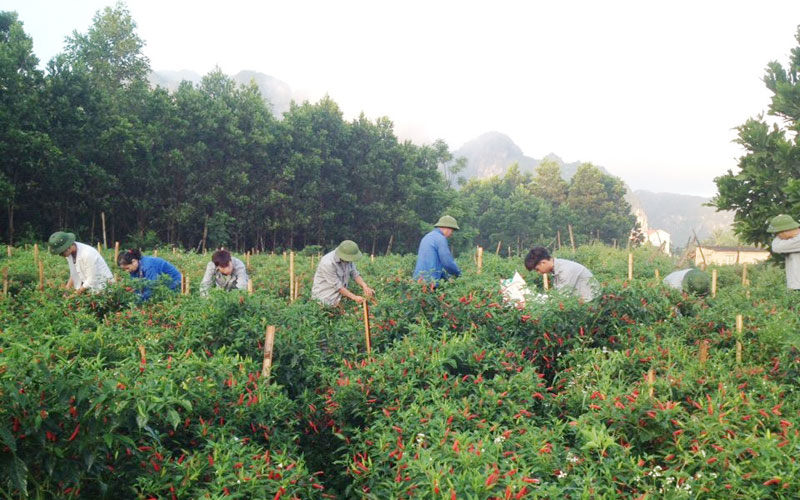
(HBO) – Building agricultural production models connected in chains is considered a new way to help farmers sustainably improve their products’ value. To restructure local agriculture towards higher added value and sustainable development, Lac Thuy district has issued many mechanisms and policies to encourage production chains with contracts between businesses and farmers, cooperative groups and cooperatives.
A chili farming model in An Lac commune (Lac Thuy district) generates
about 180 million VND (over 7,700 USD) per ha in revenue.
To carry out a value chain connectivity project
under the national target programme on new-style rural area building, Lac Thuy
district implemented three projects with total investment of 1.5 billion VND
(nearly 64,500 USD) in 2017. These value chains linked farmers with businesses
through cooperatives and cooperative groups. Accordingly, companies were in
charge of providing seeds, instructing intensive cultivation techniques and
purchasing products.
The district held 10 meetings to train member
farmers in farming techniques and supported them with materials for cultivating
15.8ha of chili plants and 13ha of vegetables. It also provided 8,000 head of
small livestock and 20 tonnes of animal food. Two trips were also organised to
help farmers learn about chili production and processing experience in Hung Yen
and Hai Duong provinces.
Chili, pumpkin and vegetables farmed in these
value chains have been purchased by the Mien Bac Green Agriculture JSC, the
Vietnam Chili Co. Ltd and the safe food agricultural cooperatives of Lac Thuy
district. They generated 6 million VND (258 USD) per sao (360 sq.m) or 180
million VND per ha.
Economic benefits from these farm produce have
proved to be higher than from other crops. Meanwhile, chicken farming under
value chains has also brought about considerable profit and won the trust of
businesses and consumers, thus creating stable and concentrated production
areas.
These projects have helped improve income and
create jobs for local farmers while ensuring stable sales of their products and
protecting the environment.
Agricultural production in value chains is a
sustainable way to promote production effectiveness and farmers’ income. It
ensures that parties in value chains share interests and responsibility, supply
meets demand, and product origin is traceable./.
According to data from the Hoa Binh Provincial Party Committee, the industrial production index for the first six months of 2025 is estimated to have increased by 20% compared to the same period last year. This marks the highest year-on-year growth rate for this period since 2020.
In the first six months of 2025, Hoa Binh province’s export turnover was estimated at 1.145 billion USD, marking an 18.11% increase compared to the same period in 2024. Import turnover was estimated at $ 804 million, a 17.15% increase, which helped the province maintain a positive trade balance.
The lives of the ethnic minority farmers in Tan Lac district have gradually improved thanks to the new directions in agricultural production. This is a testament to the collective strength fostered through the professional associations and groups implemented by various levels of the district’s Farmers’ Union.
With the motto the "product quality comes first,” after nearly one year of establishment and operation, Muong village’s Clean Food Agricultural and Commercial Cooperative, located in Cau Hamlet, Hung Son Commune (Kim Boi district), has launched reputable, high-quality agricultural products to the market that are well-received by consumers. The products such as Muong village’s pork sausage, salt-cured chicken, and salt-cured pork hocks have gradually carved out a place in the market and they are on the path to obtaining the OCOP certification.
In the past, the phrase "bumper harvest, rock-bottom prices" was a familiar refrain for Vietnamese farmers engaged in fragmented, small-scale agriculture. But today, a new spirit is emerging across rural areas of Hoa Binh province - one of collaboration, organisation, and collective economic models that provide a stable foundation for production.
Maintaining growing area codes and packing facility codes in accordance with regulations is a mandatory requirement for agricultural products to be eligible for export. Recently, the Department of Agriculture and Environment of Hoa Binh province has intensified technical supervision of designated farming areas and packing facilities to safeguard the "green passport" that enables its products to access international markets.



